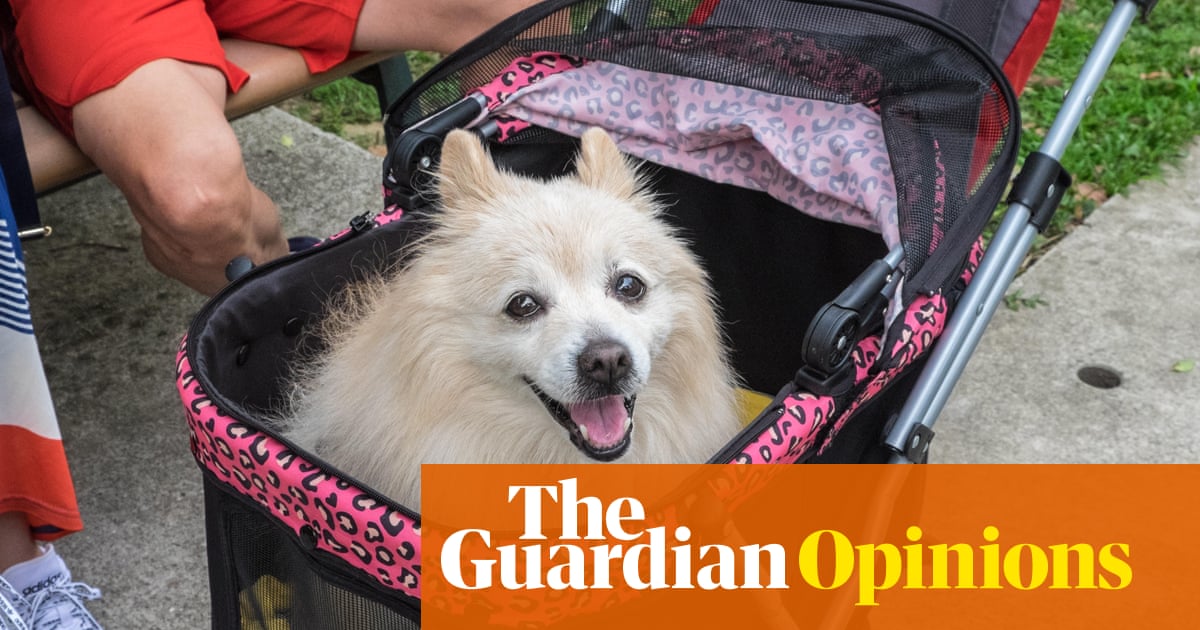Sometimes, when surprising new findings are published, you can’t help but wonder why they asked that particular question, even as your interest is piqued by the answers. Last week,European Psychologist publisheda review of recent advances in pet research, and wrote: “Given the two trends of more dogs being viewed as family members and a decline in the number of children, an important question arises: are people choosing dogs as a substitute for children?”
The authors concluded: well, sometimes. One study found that 16% of dog owners actively thought of their dogs as children; another commented on the frequency with which owners referred to themselves as “pet parents”, their best friends as “fur babies”. However,they also cautioned that, “contrary to popular belief, only a small minority of dog owners actually treat their pets like human children. In most cases, dog parents choose dogs precisely because they are not like children.”
The authors are based in Hungary, where low birthrates have been a hot-button issue for ages. This has led to policies that hit peak Handmaid’s Tale this year, when the prime minister, Viktor Orbán, announced thatmothers of two children or morewould be exempted from paying income taxfor life. So this intervention was rather cheering – in the first place, for being entirely factual and not prescriptive, and in the second, for talking about dogs. Generally speaking, and very noticeably when it comes from Orbán, the low-birthrate conversation is just hard-right world-building, an illogical mix of being fiercely anti-immigration while simultaneously hand-wringing that you’re one generation away from having not enough people.
Bring dogs into it, and everything feels calmer, kinder – or, at least, it does if you love dogs. And those who do will never quite get what non-dog lovers object to about them, which is a good thing, because if they did – or should I say, if we did – this is a hill we’d definitely die on.
If you have a dog and a child, or just a dog, or neither but have had a dog in the past and have also met children, you’ll know that, far from being fungible objects of love, they’re actually the opposite of one another. While once people talked about the history of canine domestication via the wolf, it has since emerged that dogs and wolves are not that similar, and as much as we domesticated dogs,they also domesticated us. They taught us how to commune with another species, surrender to the unknowable, driven by nothing more or less complicated than love. Dogs can also sit and, often, give you their paw. Children, by contrast, are completely untrainable, and by the time they have trained themselves in ways that are very surprising (this could never be said about a dog), they’ll be on their way. Which, again, is not a thing that dogs do.
Speaking for myself, if I wanted to unlock this conundrum, I’d look elsewhere. Are birthrates going down because of declining living standards? Or to put that more simply: can anybody afford a baby? If we wanted to create societies conducive to large families, would we need to rediscover ambition in public services, and generosity in state support? Is there a pressing global pessimism, rooted in real and observable catastrophes such as inaction on the climate crisis and impotence in the face of conflict? Could it be that the world increasingly looks like an unlovely place for an infinitely precious and fragile human?
And if I were absolutely determined to bring dogs into it – for instance, if I were a specialist in dog-human relationships – I would still lean towards the social determinants of pet ownership over parenting. This could focus on the availability of family care, and economic and time constraints, which the paper mentions briefly, rather than individual behaviours, such as mistaking your dog for a baby.
The real reason dog ownership can’t be seen as fulfilling “a nurturing drive similar to parenting, but with fewer demands” (as the authors put it), is that it’s not actually easier than having children. If there’s any parallel, it’s with the very earliest years of child rearing, when they have no independent universe of their own, look to you as their sun and moon, and will put literally anything in their mouth just to see what happens.
As much joy as there is in this phase, it’s easily the hardest bit. Considering this post-pandemic world, in which dog ownership, in the UK at least, is through the roof –3.2m pets were bought during lockdownalone – you realise how much people relish having demands on their time and affection.
Zoe Williams is a Guardian columnist
